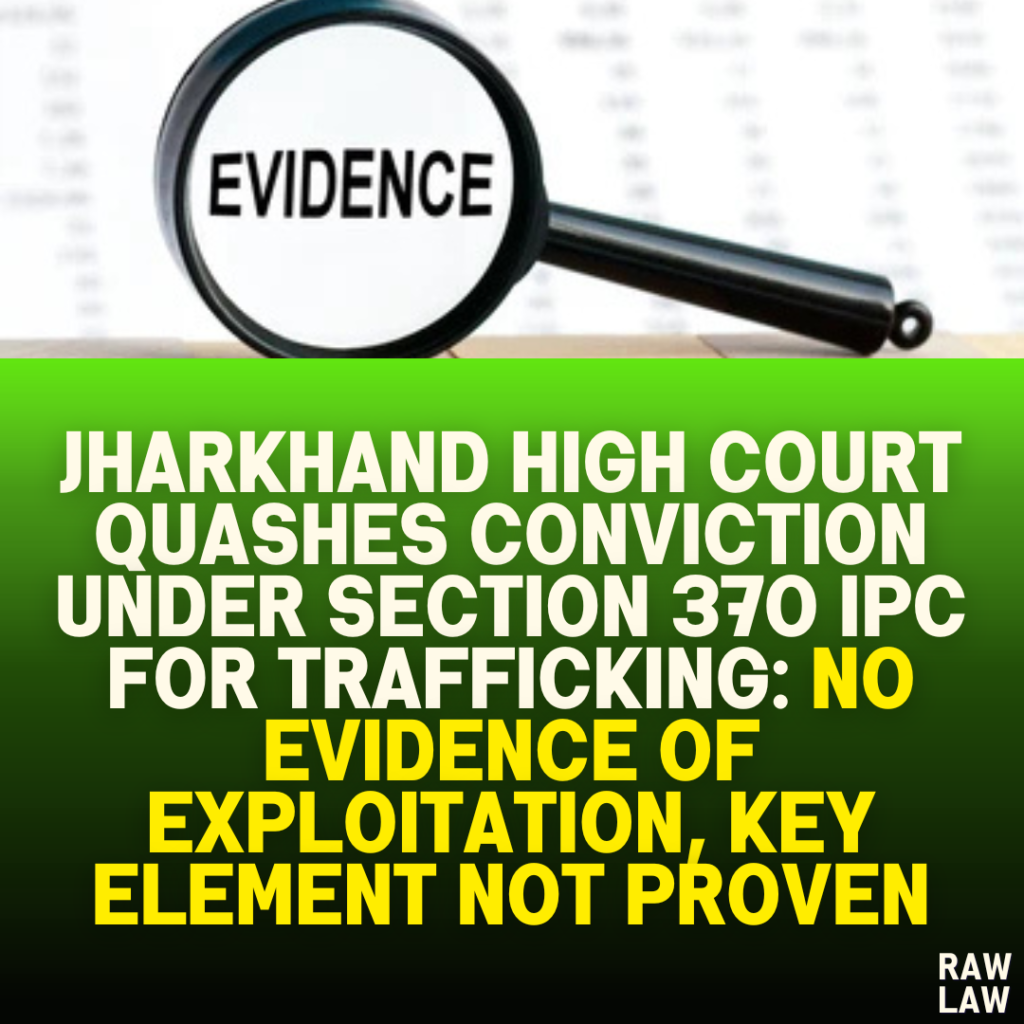Court’s Decision:
The High Court of Jharkhand, in its judgment dated October 17, 2024, set aside the conviction and sentence of the appellants under Section 370(5) and 120B of the Indian Penal Code, citing the absence of evidence of exploitation. The court ordered the immediate release of one appellant from custody and discharged the other from bail bond liabilities.
Facts:
The case originated from an FIR filed by the informant (mother of one of the victims), who alleged that several minor girls, including her daughter, were taken to Delhi under false pretenses for work by the appellants. The prosecution’s case was built on the testimonies of witnesses, particularly PWs 1, 7, and 10, who confirmed that the girls had been taken to Delhi. However, they returned within a week, and no evidence of sexual exploitation or coercion was presented. The trial court had earlier convicted the appellants under Section 370(5) IPC and sentenced them to 15 years of rigorous imprisonment.
Issues:
- Whether the appellants were involved in trafficking the minor girls as defined under Section 370 of the Indian Penal Code.
- Whether the prosecution successfully established exploitation, which is a crucial element under Section 370 IPC.
Petitioner’s Arguments:
The appellants argued that the girls went to Delhi voluntarily due to poverty and returned shortly after. There was no evidence of exploitation or force, and the minor girls were not subjected to any form of coercion or mistreatment. They contended that the prosecution failed to establish the necessary elements of trafficking.
Respondent’s Arguments:
The State argued that since the girls were minors, their consent was immaterial, and the appellants were guilty of trafficking as defined under Section 370 IPC. The mere act of taking the minors to Delhi without parental consent constituted an offense.
Analysis of the Law:
Section 370(1) of the Indian Penal Code defines trafficking as the act of recruiting, transporting, or receiving persons for exploitation, including physical and sexual exploitation, slavery, and servitude. The law requires an element of exploitation for the offense of trafficking to be established.
Precedent Analysis:
The court relied on the statutory interpretation of “exploitation” as defined under Section 370 IPC and explained in legal dictionaries. Previous cases have emphasized the necessity of proving actual exploitation, be it physical or sexual, to uphold a conviction under this section.
Court’s Reasoning:
The court observed that none of the witnesses, including the victims, testified to any form of exploitation. The victims returned home soon after arriving in Delhi, and there was no evidence of coercion or mistreatment. The court emphasized that the absence of evidence on the key element of exploitation made it impossible to uphold the conviction under Section 370 IPC. It further noted that the law is clear in requiring exploitation as a component of the trafficking offense.
Conclusion:
The court quashed the conviction and sentence, allowing the appeals. It directed the immediate release of one of the appellants and discharged the bail bonds of the other.
Implications:
The judgment reinforces the necessity of proving exploitation for a conviction under Section 370 IPC. It highlights that the mere transportation of minors without their parents’ consent does not automatically constitute trafficking unless there is clear evidence of exploitation. This ruling may impact future cases involving allegations of trafficking, emphasizing the need for a thorough examination of evidence related to exploitation.
